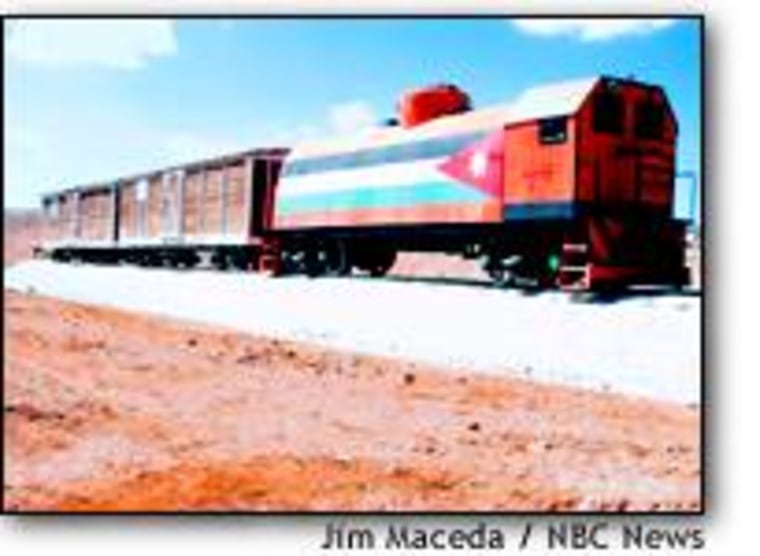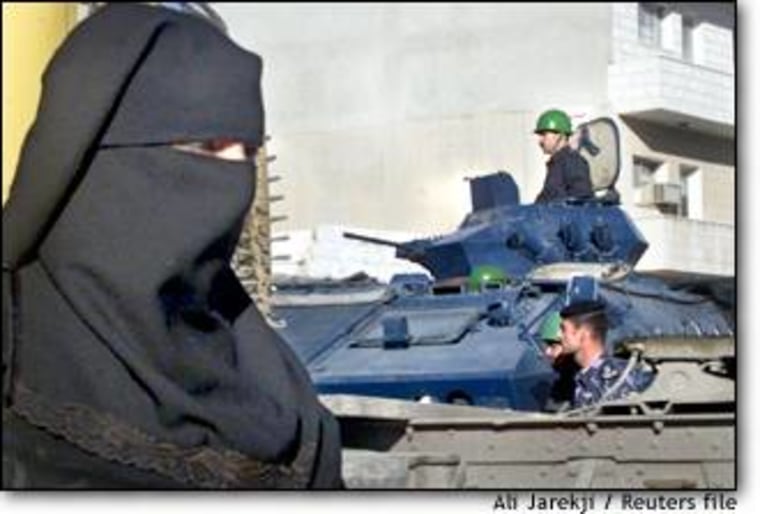Jordan’s King Abdullah II, like other Arab leaders, has left little recourse to his subjects to express their opinions on an imminent war in Iraq. In lieu of the workings of democracy, these leaders are moved to act — and their regimes largely manage to stay in power — through an uncanny ability to read the tea leaves, particularly any signals of discontent coming from their respective “Arab streets.”
There is perhaps nowhere more watched these days in Jordan than the streets of Ma’an. Once the nation’s desert capital, the dusty town of 40,000 it has fallen on hard times in recent years.
Some have called Ma’an a hotbed of Islamic extremism; others say its problems simply illustrate everything that is wrong in the Arab world — illiteracy, unemployment, tribal defiance of the law and and a pent-up resentment of the central government and, by extension, the U.S. administration that supports it.
But few doubt that, if there is a war next door, Ma’an will be one of the first flashpoints to ignite outside Iraq.
COMMERCIAL CROSSROADS
Ma’an is situated on what was once a thriving commercial crossroads to Iraq and Saudi Arabia.
But its trucking-oriented economy withered away after more than a decade of international sanctions on Iraq, cutting trade to the east. At the same time, the old Hejaz Railway that carried dinar-spending pilgrims on their annual hajj to Mecca is now defunct.
Over time, residents have felt increasingly abandoned by a government that promised investment, schools and jobs, but delivered on little, forcing the city to fend for itself with almost no resources.
The result has been an explosive mix of poverty, resurgent Islamic fundamentalism, crime and violence.
Ma’an has witnessed four anti-government riots since 1989, unrest that needed little to spin out of control, a small rise in the price of fuel or in the cost of a loaf of bread.

But nobody was prepared for the violence last November, triggered this time by a police investigation of a Ma’an-based group of Islamic militants with a reputation for tormenting the local population with threats and guns.
The leader of the group, Mohammed Shalabi, is a former air force pilot and civil servant. A pious and charismatic man from a prominent tribe, Shalabi also goes by the name of Abu Sayyaff — not to be confused with the terrorist group in the southern Philippines.
MURDER INVESTIGATION
According to an independent study of Ma’an’s unrest, published recently by the Brussels-based International Crisis Group, Shalabi allegedly fired on police who wanted to question him in connection with the October murder of U.S. diplomat Lawrence Foley in Jordan’s capital, Amman.
Shalabi fled into town, where his tribe refused to turn him over to police. In response, thousands of Jordanian Special Forces launched a massive assault — including helicopter gunships — on a residential area where dozens of his followers were hiding.
Troops riddled buildings with five-caliber bullets with no apparent regard for innocent families or neighbors. According to ICG report, “the clashes left six dead, and more wounded, over 150 arrested for questioning or prosecution, and property destroyed.”
Abu Sayyaff is still at large, opening the government to a barrage of criticism and allegations of police brutality.
“Ma’an is a very classic example of the ineptitude of the central government,” said Mustapha Hamarneh, a well-respected Arab affairs expert based in Amman. “It cannot see socio-economic problems as they are, it deals with issues of unrest form a security perspective and a military perspective — this is a failed policy.”
POLICE LOCKDOWN
Three months after the incident, NBC News was given permission by the Ministry of Information to visit the town, still under a virtual police lockdown.
The purpose of the somewhat surprising invitation became much clearer when the first stop was the governor’s headquarters for a “briefing.”
Once inside and the formalities of sweet Turkish coffee behind us, the governor, Mohammad Breikat, introduced a handful of local residents whom he described as “representatives of the local population who will tell you everything you need to know about the situation here.”
The offer was declined. Instead, over the next two days, local “minders” kept a close eye on every move as NBC sought to interview residents along the streets of Ma’an.
Amid the close scrutiny, most people expressed the government line, that the people loved Abdullah and their country, that Abu Sayyaff and his followers had been neutralized, and that Ma’an was once again back to normal.
PRESSURE COOKER
But in reality, Ma’an is a kind of pressure cooker. Heavily armed police commando units, with armored personnel carriers, were deployed at many key locations in and out of town.
Nevertheless, some residents were prepared to challenge the official policy.
“You don’t crack down on a city like that,” a middle-aged customer said in a modest teashop, in between puffs on his water pipe.
“You should go for the individuals and not the whole city. It’s not more security we need here. The people need a future. Open a few factories, give jobs to the youth, so they don’t go and join those Islamic groups and then strike out the town.”
Under his breath, he added: “This was once thriving capital, now its breeding grounds for terrorists. So sad.”
The city’s chief preacher, Sheik Mughribi, was also candid about the tension.
“Both sides are to blame,” he said, sitting on pillows beneath garish wallpaper depicting huge crowds of worshippers in Mecca during hajj. “The trouble makers were wrong, and the government was also wrong.”
Police and the official minders, in deference to the preacher, stayed outside the house during the interview.
Sheik Mughribi has no doubt about what would happen here if there were a war in Iraq. “Right now, thanks to the police in streets, things are quiet. But if there is war nearby, that could change. Abu Sayyaff would find a way to take advantage of a war in Iraq for all the wrong reasons.
READY TO ERUPT?
Many analysts agree with the sheik.
The ICG report concluded that “the underlying causes of the recent political and criminal violence remain, with the ever present risk that it could erupt again.”
It noted that possible triggers could be a war on Iraq or an escalation of the Israeli-Palestinian conflict.
The reports went on to say, “Ma’an has become something of a litmus test for Jordan — a test of governmental polices, national institutions, the private sector and civil society. There has been a collective failure of all four to date, and time is running short.”
Meanwhile, there is a strong feeling that a war on Iraq will set back Jordan’s own war on Islamic militancy.
“The war in Iraq will complicate everything,” analyst Mustapha Hamarneh said. “And this is what the Americans are unwilling to accept, that there is an ‘Arab street.’ That there is public opinion here. A war will have accumulative effect, and that will be to create more bin Ladens, and more Abu Sayyaff.”
Before leaving Ma’an, the NBC team paid a courtesy call on the governor. There was more sweet coffee and more smiles.
“So, you see, Abu Sayyaff is nothing. Ma’an is like a normal town now. Please tell that to your viewers,” the governor said.
Then, quickly changing his jovial tone, Breikat leaned toward the interpreter to add, “Please tell him to tell Mr. Bush not to make war in Iraq. Ma’an can’t afford it!”
(Jim Maceda is an NBC News correspondent based in London, currently on assignment in the Middle East. )
